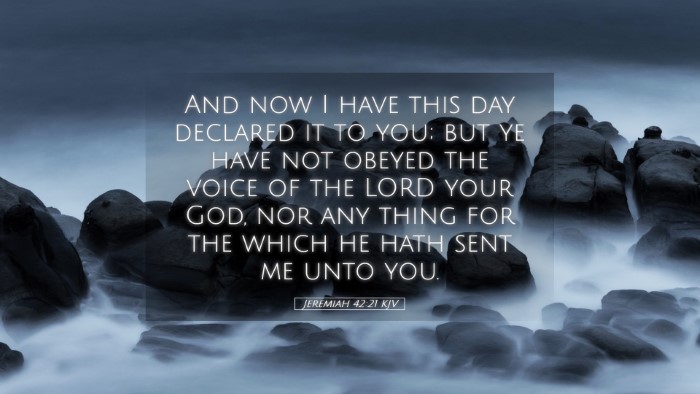Commentary on Jeremiah 42:21
Jeremiah 42:21 states:
"And I have this day declared it to you; but you have not obeyed the voice of the Lord your God, nor anything for which He has sent me to you."
Introduction
This passage occurs in a significant moment in the narrative of the prophet Jeremiah. The context involves a remnant of Israel seeking guidance after the fall of Jerusalem. They are presented with a test of their faith and obedience to God's word as delivered through the prophet. This commentary synthesizes insights from various public domain sources, offering a comprehensive understanding of this pivotal verse.
Contextual Background
The immediate context of Jeremiah 42 involves a group of people, primarily military leaders and their families, who approach Jeremiah after the Babylonian conquest. They inquire whether they should flee to Egypt or remain in Judah. Their willingness to seek divine guidance juxtaposes their subsequent disobedience, which forms the crux of Jeremiah's message.
Exegesis of Jeremiah 42:21
In this verse, we observe several critical themes:
- Divine Communication: God speaks through His prophet Jeremiah, indicating that His directives are clear and unequivocal.
- Human Disobedience: Despite receiving God's word, the people do not listen, exemplifying a common human condition of ignoring divine instruction.
- The Consequences of Rejection: The rejection of God’s guidance brings severe repercussions, which Jeremiah later elaborates.
Insights from Public Domain Commentaries
Matthew Henry
Henry emphasizes the gravity of disobedience against divine commandments. He notes that God's declarations are not merely suggestions; they carry the weight of authority and expectation. The people’s unwillingness to heed the voice of God demonstrates a profound spiritual rebellion:
"To refuse what God has required is to deny His sovereignty and to deceive oneself about the seriousness of sin."
Albert Barnes
Barnes provides a theological lens through which to understand the implications of this rebellion. He states that disobedience stems from a lack of faith. The Israelites doubt God's promises and wisdom, leading them to seek their own solutions instead of trusting in God's plan:
"Their hearts were inclined towards Egypt, not believing that God could preserve them in Judah even amidst devastation."
Adam Clarke
Clarke discusses the repercussions of this disobedience, pointing out that the very act of seeking God's counsel while planning to disregard it is hypocritical. He highlights a crucial lesson for believers, noting that:
"True obedience must accompany sincere inquiry; otherwise, such questions are mere formalities."
Theological Implications
This verse invites deeper reflection on multiple theological themes:
- The Nature of God’s Will: God’s will is expressed through the prophet, and believers are called to discern and follow it.
- The Human Condition: The inclination to disobey and misunderstand God's intentions is a universal theme, emphasizing the need for grace.
- The Role of Prophecy: Prophets serve as messengers, conveying God’s words which must be taken seriously by those receiving them.
Practical Applications
This passage encourages believers to evaluate their response to God’s word. Here are some practical applications:
- Cultivating Obedience: Develop a heart that is willing to obey God's directives, akin to the instruction given in this passage.
- Engaging with Scripture: Regularly read and meditate on the Bible to understand God’s will and apply it in daily life.
- Community Accountability: Foster a community that encourages accountability and obedience to God’s teachings, reflecting on the consequences of collective disobedience.
Conclusion
Jeremiah 42:21 stands as a poignant reminder of the struggle between divine guidance and human willfulness. Insights from commentaries by Matthew Henry, Albert Barnes, and Adam Clarke enrich our understanding of the critical intersection of faith, obedience, and the responsibilities of those who hear God's voice. As students, theologians, and pastors, it is essential to reflect on our responses to God’s word, ensuring that our inquiries are accompanied by a genuine commitment to obedience.


